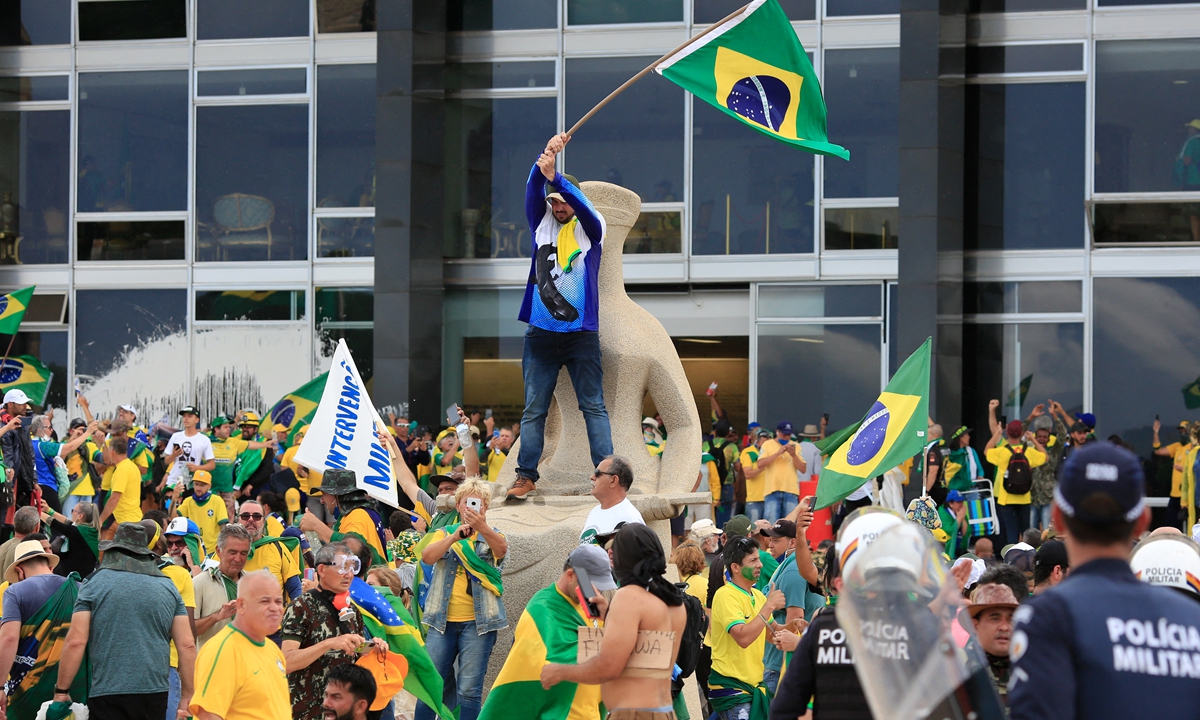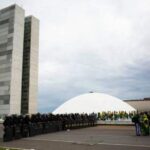What the Brazilians had feared happened. But when the shoe dropped, it still shocked Brazil and the rest of the world. On Sunday afternoon, thousands of demonstrators who were dissatisfied with the results of the presidential election invaded institutions such as the Congress, the Supreme Court and the presidential palace in the capital Brasilia, clashing with police. This scene is almost a “perfect replica” of the US’ “Capitol riot” two years ago. The US-based Atlantic Monthly published an article, saying that Americans set an example for the rioters in Brazil. This speaks to the consensus of many people – without the example of the US, there is no place for others to learn from the ugliest manifestation of democracy.
The riots were widely condemned immediately by the international community, which reflects that violent attacks on state institutions cannot be tolerated in any civilized society ruled by law. This is a matter of principle. It is noticeable that US President Joe Biden’s tone was the most aggressive. He said that the riots in Brazil were “outrageous.” Democratic officials have also denounced them one after another, associating them with the “Capitol riots,” while the Republican Party is evidently low-key. The stark contrast between the two parties gives the impression that Washington’s stance on this issue is based on the need for partisan infighting.
Objectively speaking, the riots in Brazil provide the US government, led by the Democratic Party, an opportunity to use politically. It intends to “ride the wave” against the side blamed for the “Capitol riot”: former President Donald Trump and the Republican Party. But for the rest of the world, the emergence of “Capitol riots” is not simply because Trump in Republican Party, but in the US as a whole, something is terribly wrong with the political system.
The “Capitol riot” sets a poor precedent for the world. Washington’s manner toward the riots has superficially reached a consensus, but political polarization and division have not eased, but instead have intensified. In fact, even on the country’s own events to commemorate the second anniversary of the “Capitol riot” two days ago, the US still showed huge political rifts: almost all of the participants were Democrats, while Trump’s supporters and opponents put on a rival show near the Capitol. Now people can see that the “US-style democracy” not only collapsed inside, but also began to roll down with the surrounding rocks.
To some extent, the riots in Brazil should prompt the US to conduct a profound review, and also adjust its internal and external behavior on the basis of self-reflection. If it only stays in condemnation with utilitarianism, the destructive impact of “American democracy” on the world will not stop in Brasilia.
The US calls itself the “beacon of democracy” and spares no effort to peddle or even sell its own democratic model by force around the world. But others are not only listening to what it says, but will also observe what it does. The US, who wants to be a “preacher of democracy,” needs to understand a Chinese proverb: Practice is better than precept.
US’ “precept” has formed a discourse system similar to spiritual pyramid schemes, but its “practice” is very disappointing, which in turn has become an irreparable logical loophole in its discourse system. In other words, the US denies itself and slaps its own face. This kind of denial and slap is the most radical. It is better for the US not go to other places to “preach democracy,” before finding its own way.
Much of the political polarization phenomenon and the chaos and turmoil it has caused stem from the US. On the one hand, the US society is severely divided and the populist sentiment is strong. The existing system cannot resolve and suppress it, and it is also difficult to block the transmission to the political arena. What is manifested is inevitably political polarization, which has brought about an extremely bad example in the world.
On the other hand, the US practices double standards with other countries, which is even worse. Based on the needs of geopolitical strategy, Washington’s attitude toward similar incidents often makes a U-turn. For example, Washington strongly condemned the riots in Brazil, but it is much more gentle and ambiguous about other similar violent incidents. In some countries, it even encourages and supports the contempt for the rule of law and the subversion of establishment to instigate a “color revolution.” Washington has done a lot of such things in Latin America.
In today’s chaotic and intertwined international situation, a radical political virus can easily find a suitable hotbed for survival, and it has become more infectious and pathogenic. After Washington’s catalyst, its destruction will sharply increase. And it is bound to backfire on the US. The unrest in Brazil has once again sounded the alarm for the US.













